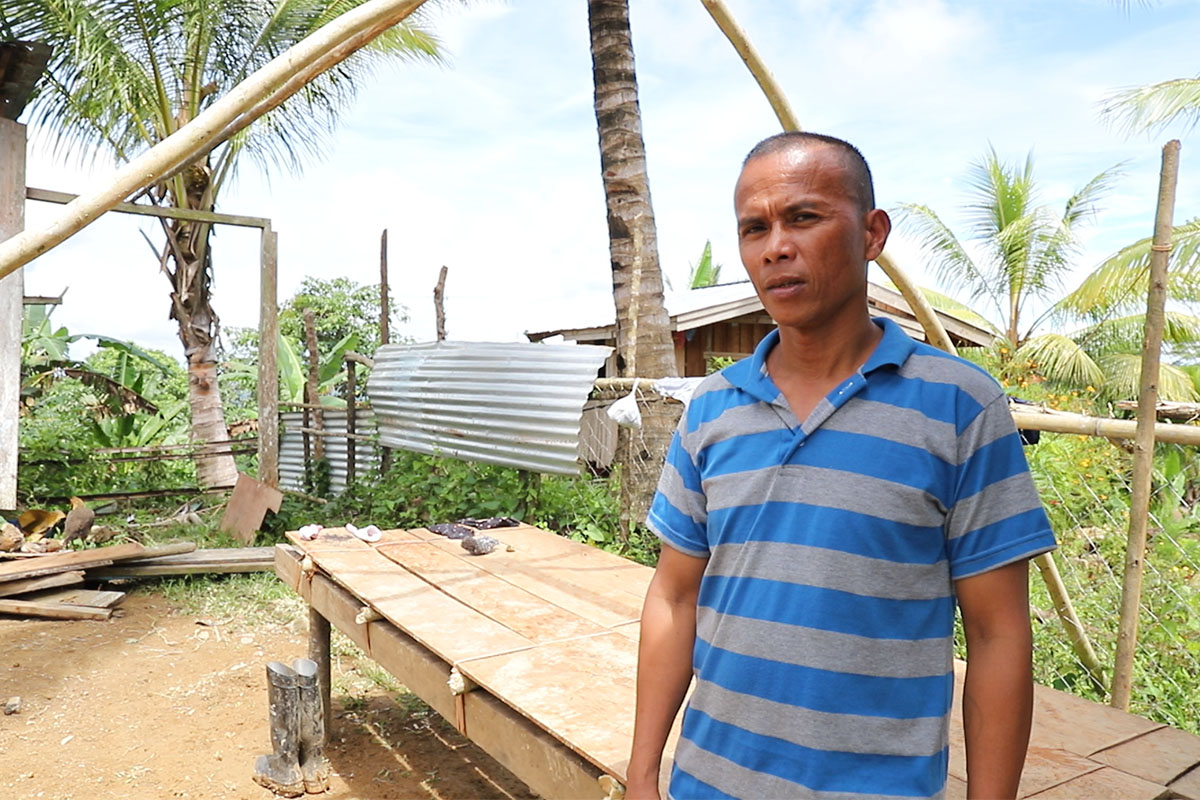Providing sustainable solutions to the most vulnerable communities affected by conflict and the climate crisis
Fifty-two families in Sitio Salaysayon were recently given solar lamps and rainwater collectors. Your committed support makes it possible for UNHCR to help the most vulnerable forcibly displaced communities in mitigating the effects of climate change.
Sitio Salaysayon is a far-flung mountain community in Barangay Jaguimitan, Nasipit, Agusan del Norte reachable only by foot or aboard modified motorcycles locally known as skylabs, which are operated by the sitio’s residents. Their remote location has made it challenging for the 52 families (approximately 260 individuals) belonging to the Higaonon tribe to access basic needs like water, electricity, and even food.
The community has been displaced multiple times because of armed conflict between state and non-state actors. They are also susceptible to climate hazards such as typhoons, which have previously led to forced displacement.
“Adtong bagyo nga Pablo ug kadtong naa pa to’y nagsunod nga bagyo, grabe kalisod. Asa man mi mudagan? Wala man mi mga building nga taguanan. Karon, naa ma’y usa ka room diri sa eskwelahan, so didto mi nagdasog tanan, grabe ka-piot.” (During Typhoon Pablo and the typhoons that came after, life was very difficult. Where do we run? We don’t even have a building to seek shelter in. There was one room in the school building, and that’s where we all sought shelter, even if it was very crowded), shared resident Pastor Arnom Gando, who served as the barangay’s very first chairperson.
To help address the safety situation and challenges faced by Salaysayon’s residents, the pooled donations from private individuals in the Philippines, the support of the Australian Government, in collaboration with the local government unit and project partners has provided 52 solar lamps, one for every family in the community.
Sitio Salaysayon has no access to electricity – they only have a single solar panel that belongs to the elementary school. The lack of light makes them feel insecure especially during nighttime. Before, residents used to travel far just to recharge their cellular phones, which they rely on for communication especially during emergencies. Their new solar lamps not only give them light, but also serve as generators that can be used to charge their mobile devices.
Pinie Mangumihay, the purok leader of Sitio Salaysayon, recalls how difficult life was before, especially in times of emergency. “Sauna man gud katong wala pa ni ang solar, usahay naa’y pasyente, maglisod mi’g tabang kay ngitngit. Kung naa’y pasyente nga dalhon sa ospital, wala’y suga nga nagbaktas. Karon nalipay mi nga naa na gyud.” (Before these solar lamps, we would have a difficult time helping anyone with a medical emergency. If we need to bring a patient to the hospital, we would have to trek in total darkness. But now we are overjoyed that we finally have light.)
Another major challenge in the community is the lack of safe and adequate water. UNHCR also provided a water collector to each family that would allow them to save and store rainwater for household use. At present, the community’s sole water source is from a nearby spring, which dries up during summer. During this time, residents would have to walk for 2 kilometers just to fetch water from another location.
Both interventions form part of a Quick Impact Project (QIP) implemented by UNHCR through Assistance and Cooperation for Community Resilience and Development, Inc. (ACCORD), handed over to the community on 28 October 2021, with the strong support and commitment of the local leaders and community members.
“Ang mga taw sige’g sturyahay – sige lang, mag-antos man ta karon, pero sa pila nalang ka adlaw, naa na ta’y suga.” (We kept discussing amongst ourselves – don’t worry, life may be difficult now, but in three more days, we will finally have a source of light), shared resident Pastor Arnom Gando about the days before the handover.
“The QIP can be considered simple, small-scale, and low-cost but can address the most urgent needs of the community. In the long run, it can promote positive change in the community,” said Sindhy Obias, ACCORD Executive Director. “The solar lamps and rainwater collectors distributed to each of the families in the village are necessities that intend to contribute to improving their living conditions.”
QIPs such as these provide immediate assistance to pressing problems in communities such as Salaysayon, which have experienced and continue to be at risk of forced displacement. While addressing these immediate concerns, UNHCR also continues to work with government and humanitarian actors to find solutions to the recurring displacement in Mindanao.
The climate crisis is driving displacement and makes life harder for those already forced to flee. Your committed support makes it possible for UNHCR to help the most vulnerable forcibly displaced communities in mitigating the effects of climate change. Your contribution gives life-saving assistance and keeps them safe from the elements, as well as helps their long-term recovery by ensuring access to basic services and sustainable solutions.
Thank you for sharing your warmth to the most vulnerable this season.
Share on Facebook Share on Twitter



